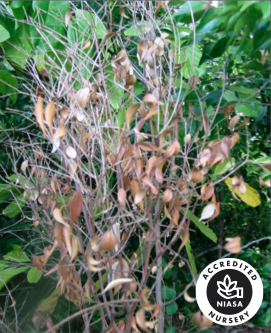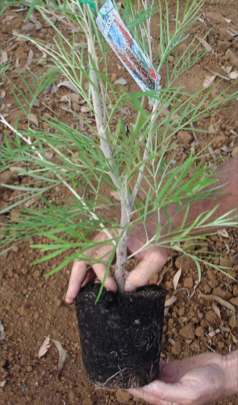Local North Queensland information for Local North Queenslanders.
There’s lots of reasons why plants may die – old age, drought, the dog sat on it… But sometimes plants die for no apparent reason…
 If this is the case, then the following should be considered.
If this is the case, then the following should be considered.
- Watering:
Failure to water adequately at the time of planting is THE most common cause of plants dying within a few days of planting. Plants should be watered-in with at least a bucket-full of water immediately after planting, even if it’s raining. Information Sheet No 4 “Watering Your Native Plants” gives more information about this. - Fertilising:
Applying too much fertiliser is probably the second most common cause of death in new plantings. Little plants only need a little bit of fertiliser, and it is all too easy to over-do it. Too much fertiliser is like medicine – the right amount is good for you, an overdose can kill. Since it is extremely difficult to measure the correct amount of fertiliser for a little plant, and since they don’t really need much anyway, Yuruga’s advice is simply DON’T.
The common practice of putting fertiliser in the bottom of the hole at planting is very dangerous. The plant will go along quite happily for the first few weeks until its roots hit the concentrated fertiliser – then all of a sudden the plant will drop dead – poisoned by the concentrated fertiliser it’s grown into.
When you buy Yuruga’s plants, the potting mix has long-life fertiliser in it, plenty to sustain the plant for the first couple of months, so please, don’t risk killing your plants by fertilising them while they’re still babies.
Information Sheet No 5 has more information on this topic.
- Teasing out the roots:
When you plant your plants, DO NOT tease out the root-ball. Teasing or pulling at the roots damages the fine feeder roots which absorb the water and nutrients for the plant. By damaging the roots, you run a very high chance of killing the plant. Don’t take any notice of books, articles, or TV shows which say otherwise – this is an outdated piece of advice left over from the days when nurseries sold root-bound plants. Yuruga’s plants are not root-bound! - Root-rot diseases:
If you’ve ruled out fertiliser, root teasing, or failure to water adequately, then the most likely cause of sudden death in plants is root-rot disease.
Root-rot disease is commonly caused by a fungus called Phytophthora which destroys the roots of plants. Since the most important function of roots is to absorb water, an infected plant wilts severely as if the ground is bone dry, even though the soil is quite moist. Once a plant exhibits these symptoms it is too late, and death is swift and inevitable.
A plant may be carrying root-rot disease for months or even years before it succumbs – like sickness in humans, it often takes some sort of stress or change for the disease to take hold. It is commonly seen during hot wet summers.
Root-rot fungus is, unfortunately, extremely common in plant nurseries. Most nurseries control it by spraying regularly with fungicides.
Unfortunately, fungicides suppress the disease but cannot eliminate it. It is therefore very common to buy apparently healthy plants which are carrying the fungus in the potting mix in the dormant spore stage. At some time later (weeks, months or even years) the spores will become active and the plants will die.
This is what the Nursery Accreditation Scheme is all about.
Accredited nurseries have production systems in place which ensure as far as possible that the plants you buy do not have root-rot diseases.
Basically, it is a matter of disease prevention (i.e. strict hygiene during production) rather than allowing the disease in and then trying to cure it with chemical sprays which don’t kill it anyway.
| Yuruga is an Accredited Nursery. We go to a lot of trouble to ensure the plants you purchase are free of disease. Look for the symbol when you buy plants – it’s for your protection. |  |

